![]() The first Nexus 7, born more than a year ago, as a whole turned out good, but in the details – it is far from universal. But the devil, as we know, is in them. Whether business update that was released this year: it should be much faster, better and sleeker predecessor. Is this true? Now check out
The first Nexus 7, born more than a year ago, as a whole turned out good, but in the details – it is far from universal. But the devil, as we know, is in them. Whether business update that was released this year: it should be much faster, better and sleeker predecessor. Is this true? Now check out
seven-inch tablet Nexus concept has not changed: the tandem two largest companies in their respective industries – ASUS and Google – are still trying to make a modern and powerful, but affordable for the masses gadget. If you compare the features of the new device and the previous model, we can see that it improved in almost everything: the screen, and computing resources, and the amount of memory, and even the back of the camera there. It seems that the new Nexus 7 developers have conducted an all-out work on the mistakes and corrected the vast majority of defects previous model. Or at least tried to do it. If they managed it? ..
? # Appearance and ergonomics
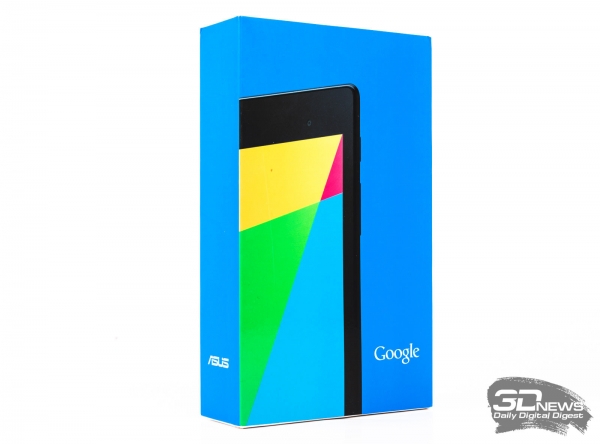
ASUS / Google Nexus 7 (2013) – factory box
Exterior of the new Nexus 7 has changed a bit. The plate was generally similar to its predecessor, however, some differences – and very important – in the exterior devices are present. Perhaps the most important of them are: the tablet threw two millimeters in thickness – from 10.7 mm to a much more manageable 8.7 mm. In addition, it has become easier – Nexus 7 model 2013 with built-in modem, weighs 300 g and 290 g without the previous model was more ponderous – 335 grams without a cell module, and about the same 10 grams more in the 3G-version.
ASUS / Google Nexus 7 (2013) – the front panel
hull shape remains the same, stretched. Frame around the screen, as before, very large – if you want to shell Nexus 7 could be used to fit the display of ng bigger size. Physical keys on the front panel not – all navigation keys touch, they are located directly on the screen. Why did it take so developers of free space around the display – is unclear. Probably, this requires internal structure of the device. The left side of the lens is 1.2-megapixel front camera and sensors sensitive area.
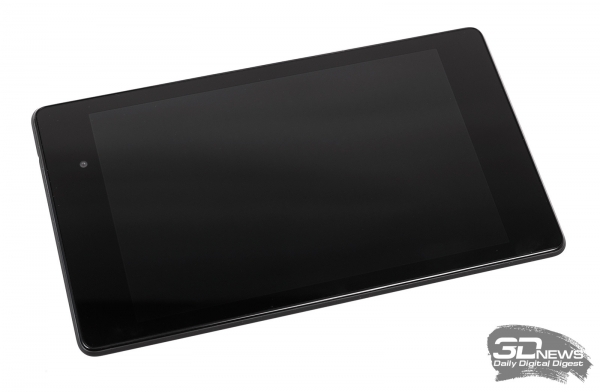
ASUS / Google Nexus 7 (2013) – Full Face
back of the tablet is made of plastic with a pleasant to the touch matte soft-touch. Unfortunately, the “back” of the new Nexus 7 is prone to quickly assemble “fingers” and dust – that the device is not lost appeal, it will have to be wiped periodically. Unlike the 2012 version, the back panel is smooth, not relief. As befits any self-respecting mobile device, “back” from the updated Nexus 7 is not removable.
ASUS / Google Nexus 7 (2013) – the back panel and sides
sides of the tablet was a lost-looking silver-plated plastic edging, making the device began to look more closely and personable. Arrangement of the various elements of the tablet standard, and therefore with ergonomic he’s all right. Lock keys / on switch and volume controls are located on the top plate. This also handed tray micro-SIM-cards, opening with a paper clip. Interface micro-USB 2.0 (which actually does not micro-USB, and SlimPort – a variation on the MHL, for more details, describe below) is located on the right hand side of the casing, and a 3.5mm audio jack – on the left. A pair of speakers to the back panel.
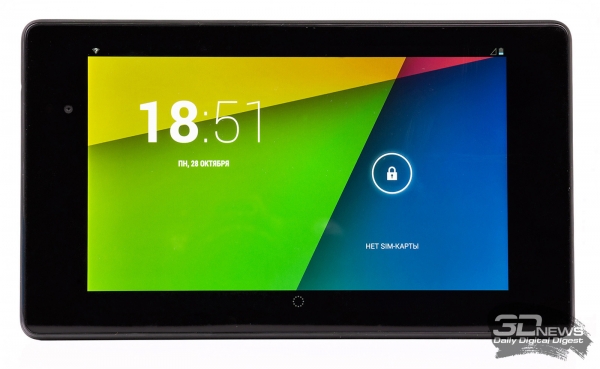
ASUS / Google Nexus 7 (2013) – a tray for micro-SIM-card on the top
assembled plate well. While squeezing the sides of the screen does not appear characteristic colored stains – the matrix Nexus 7 has a chance to relive some, not too painful blows of fate. Inside, the tablet has a sturdy frame made of magnesium alloy, giving the structure the necessary rigidity. But all exterior body parts are made of plastic – so contact with the tablet should be gently “hard landing”, he carries is not very good.
In the above video you can see the “drop-test» Nexus 7 (2013): Our colleagues from the Android Authority dropped it a few times on the concrete sidewalk and a detailed description of all damage received.
? # Specifications
| ASUS / Google Nexus 7 (2012) | ASUS / Google Nexus 7 (2013) | |
|---|---|---|
| Display | 7,0-inch, 1280×800, IPS | 7,0 inch, 1920×1200, IPS |
| Touch Screen | Capacitive, up to 10 simultaneous touches | |
| air space | No | |
| oleophobic coating | There | |
| polarizing filter | There | |
| Processor | NVIDIA Tegra 3 T30L : quad-core ARM Cortex-A9 (ARMv7), to 1.2 GHz (1.3 GHz in single-core mode), one core ARM7 (ARMv4T) 40 nm process technology | Qualcomm Snapdragon S4 Pro APQ8064 : four core Qualcomm Krait (ARMv7); frequency of 1.5 GHz; 28 nm process technology LP |
| graphics controller | NVIDIA GeForce ULV, the frequency of 416 MHz | Qualcomm Adreno 320 |
| Memory | 1 GB DDR3L-1333 | 2 GB DDR3L-1600 |
| Flash Memory | 8/16/32 GB | 16/32 GB |
| Connectors | 1 x Micro-USB 2.0 1 x headset jack 3.5 mm | 1 x Micro-USB 2.0 (SlimPort) 1 x headset jack 3.5 mm |
| Cellular | 2G/3G (optional), Micro-SIM | 2G/3G/4G (optional), modem Qualcomm MDM9215M, transceiver WTR1605L , Micro-SIM |
| Cellular 2G | GSM / GPRS / EDGE 850/900/1800/1900 MHz | |
| Cellular 3G | HSPA + (21 Mbit / s) 850/900/1700/1900/2100 MHz | DC-HSPA + (42 Mbit / s) 850/900/1700/1900/2100 MHz |
| Cellular 4G | No | LTE Cat. 3 (102 Mbit / s) band 1, 2, 3, 4, 5, 7 , 20 (European version) |
| Wi-Fi | 802.11b/g/n | 802.11a/b/g/n, 2,4 / 5 GHz |
| Bluetooth | 2.1 | 4.0 |
| NFC | There | |
| IR | No | |
| Navigation | GPS, A-GPS (Broadcom BCM4751) | GPS, A-GPS, GLONASS (Qualcomm MDM9215M) |
| Sensors | light sensor, accelerometer / gyroscope, magnetometer (digital compass) | light sensor, proximity sensor, accelerometer / gyroscope, a Hall sensor (digital compass) |
| main camera | No | 5,0 Mn (2592×1944), autofocus, no flash |
| front facing camera | 1,2 megapixel without autofocus | 1,2 megapixel (1280×768), no autofocus |
| Power | 16 Wh (4325 mAh, 3.7V) | 15 Wh (3950 mAh, 3.7V) |
| Wireless charging | No | (Qi-compatible) |
| Size mm | 196x120h10, 9 | 200x114h8, 7 |
| Weight, g | 335 | 290 (in the version of Wi-Fi) 300 (a version of 4G) |
| protection against water and dust | No | |
| Operating System | Google Android 4.1.2 (Jelly Bean) | Google Android 4.3.1 (Jelly Bean) |
| List Price | from 9990 rubles | 10,990 rubles for the 16GB version without LTE 14,990 rubles for the 32GB version with LTE |
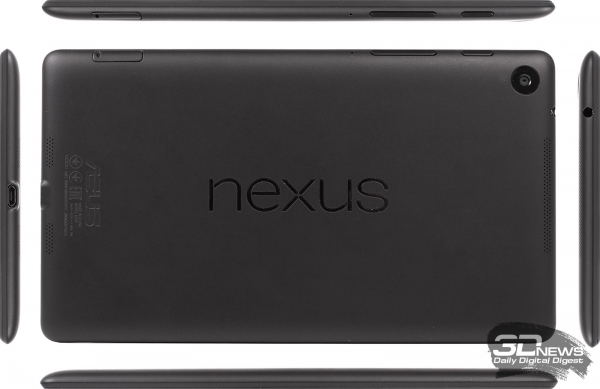 | 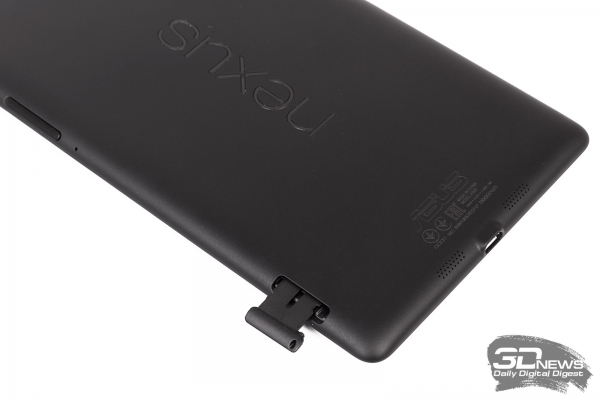 |
ASUS / Google Nexus 7 (2013) – information about the system and the “iron»
No comments:
Post a Comment